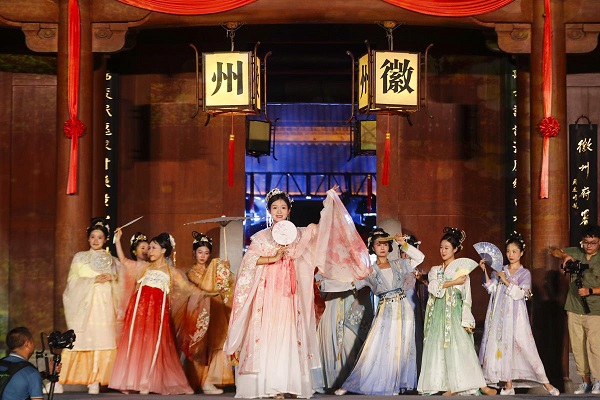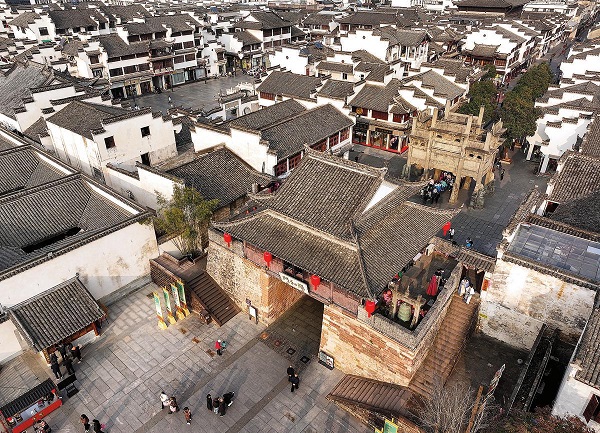
Hanfu lovers showcase the traditional Chinese dress in Huizhou Ancient Town in September. SHI YALEI/FOR CHINA DAILY
HEFEI — Dressed in traditional hanfu, Wang Zijun, manager of a coffee shop, gracefully serves steaming coffee and snacks to his customers.
The coffee shop nestled in Huizhou Ancient Town, a popular tourist destination in Shexian county, Anhui province, is adorned with traditional Chinese calligraphy and decorations such as colorful fish-shaped lanterns.
"The leisurely pace in Chinese-style coffee shops aligns perfectly with the charm of the old street," Wang said.
The town has embraced the role of introducing visitors to cultural products, martial arts performances and local snacks.
In Huizhou Ancient Town, an immersive performance based on local history and folklore captivates spectators.
According to Jiang Guangyu, the performance director, a single show attracts an audience of over 1,800 during the peak season.
"Our stories are inspired by local folklore, blending entertainment with cultural preservation," said Jiang.
In the first three quarters of this year, rural tourist areas across China received some 2.25 billion visits, a year-on-year increase of 15.5 percent, with total revenue reaching 1.32 trillion yuan ($183 billion).

Huizhou Ancient Town in Shexian, Anhui province, attracts tourists to experience the architecture, folk lifestyle and culture of Huizhou. SHI YALEI/FOR CHINA DAILY
In Yihuawan Cultural Tourism Town, located in Anhui's Susong county, visitors can hike through luscious valleys, pick fresh fruit and vegetables, and admire seas of flowers that bloom throughout the year.
According to Wang Huiwen, head of Yihuawan Cultural Tourism Town, the town's greenhouses nurture dozens of premium flower seedlings. These greenhouses function not only as an industrial base supplying plants to Fujian and Jiangxi provinces, but also as a venue for themed activities.
The town offers visitors farming experiences, science education and activities to learn about intangible cultural heritage.
Last year, the town has sold over 1 million flower seedlings. It has also created more than 400 local jobs, boosting average annual household income by 6,000 yuan.
In recent years, with ongoing improvements in infrastructure such as transportation, logistics and the internet, along with the promotion of rural cultural activities through short videos and livestreaming, events like Village BA, Village Super League and Village Gala have gained significant popularity.
Xiang Yong, dean of Peking University's Institute of Cultural Industries, said that in developing rural tourism it is important to protect local resources, build distinctive local industries and nurture a vibrant, human-centered economy.





